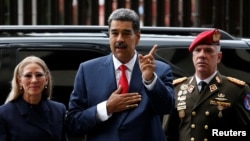Election observers and global democratic powers continue to express concern over the disputed July 28 presidential election in Venezuela.
The government-aligned National Electoral Council, or NEC, certified the vote for President Nicolas Maduro, securing him a third six-year term in office.
On August 1, U.S. Secretary of State Antony Blinken said there was “overwhelming evidence” the opposition had won.
Blinken said the results released by the Maduro-controlled NEC “were deeply flawed, yielding an announced outcome that does not represent the will of the Venezuelan people.”
Independent exit polls conducted by domestic and international election monitors and opposition tallies show that opposition candidate Edmundo Gonzalez Urrutia of the Unitary Platform won by a comfortable margin. That prompted thousands of Venezuelans to take to the streets and protest the official results.
Maduro and his allies have floated unfounded conspiracy theories that foreign-backed hackers and power failures have kept them from releasing an official tally. They also doubled down on efforts to discredit the opposition, including by labelling it “extremist.”
The head of the Madura-controlled national assembly, Jorge Rodriguez, accused the opposition of leading a “fascist conspiracy” aimed at sparking a civil war.
Rodriguez called for the arrest of popular opposition leader Maria Corina Machado, whom the Madura-controlled Supreme Court barred from running, and her stand-in Gonzalez.
In some instances, protesters had torn down Maduro campaign posters or destroyed statues of Maduro’s deceased predecessor, Hugo Chavez.
Venezuelan Attorney General Tarek William Saab seized on the incidents to depict the protesters as violent extremists instrumental in a foreign plot to “exterminate Venezuelans.”
“There are no antigovernmental protests taking place, but rather pockets of violence with destabilizing purposes that seek to create conditions for foreign intervention by spreading chaos in the national territory,” Saab said on July 30, 2023.
That is false.
Thousands of dissatisfied voters took to the streets amid credible allegations of vote rigging that fixed Maduro’s win.
Initially peaceful, the protests have turned increasingly violent after a crackdown by security forces.
Years of economic mismanagement have resulted in poverty and food insecurity, prompting millions of Venezuelans to leave the country. Those realities drove many poor and working-class Venezuelans who previously backed Maduro’s left-wing populist political ideology to support the opposition.
When Maduro declared victory on July 29, spontaneous pot banging protests, called Cacerolazo, erupted in the capital, Caracas, including in former Maduro strongholds.
Gonzalez and Machado called on their supporters to protest peacefully on July 30.
Maduro, who accused the opposition of fomenting a coup, likewise called on government supporters to take to the streets.
On July 30, the BBC reported that thousands of people walked for miles from slums in the mountains surrounding Caracas to the presidential palace.
The opposition also marched in the cities of Valencia, Maracay, San Cristobal, Maracaibo and Barquisimeto, Reuters reported.
Maduro responded to calls to concede the election by deploying the national guard.
CNN journalists on the ground witnessed national guard soldiers “repressing the mostly peaceful protests with tear gas and batons.”
Journalists from Reuters likewise witnessed security forces attack protesters.
Security forces have also fired rubber bullets to disperse the demonstrators.
There have been instances when demonstrators assaulted national guard members, and some protesters responded to national guard attacks by throwing rocks and even Molotov cocktails.
As of August 2, the Venezuelan Rights group Foro Penal said 11 people had been killed and 711 arrested since protesters took to the streets on July 29.
The Washington Post, citing multiple sources, said that at least 16 people had died.
Blinken said the violence had resulted from Venezuelan authorities “undemocratic attempt to repress political participation and retain power.”
“Law enforcement and security forces should not become an instrument of political violence used against citizens exercising their democratic rights,” Blinken said on August 1.
Meanwhile, the evidence is building that Maduro's team stole the election.
Election authorities claimed Maduro had received 5.15 million votes against 4.45 million for Gonzalez.
Brian Nichols, U.S. assistant secretary of state for Western Hemisphere affairs, said that is impossible, based on published data.
The electronic voting machines at polling stations produce a paper receipt, which voters deposited at ballot boxes to confirm whom they voted for. Once the polls closed, the voting machines produce a record showing how many votes each candidate got.
Party representatives are supposed to be given a copy of each tally sheet, and electoral authorities receive them as well.
As of August 2, the opposition and others publicly posted 24,576 precinct-level vote tally sheets — just under 82% of the 30,026 total.
Those tally sheets account for nearly 10.7 million of the 12 million-plus total votes cast during the election.
Voters also have the option of entering their identity card information on the website, where they can see the individual results from the polling station where they are registered to vote.
“The tabulation of these detailed results clearly show an irrefutable result — Edmundo Gonzalez won with 67% of these votes compared to 30% for Maduro, a margin of victory for Gonzalez of 3.9 million votes and 37 percentage points. Simply put, there are not enough votes in remaining tally sheets or actas to overcome such a deficit,” Nichols said on July 31.
U.S. President Joe Biden, Brazilian President Luiz Inacio Lula da Silva and even Maduro allies have called on Venezuelan authorities to release detailed vote counts, as they did in the past.
Maduro told the U.S. to stay out of Venezuela’s business, while also claiming he would ask the government-aligned Supreme Court to review the vote.
The Atlanta-based Carter Center, which monitored the election and found it to be undemocratic, said the Supreme Court could not offer “an independent assessment.”







